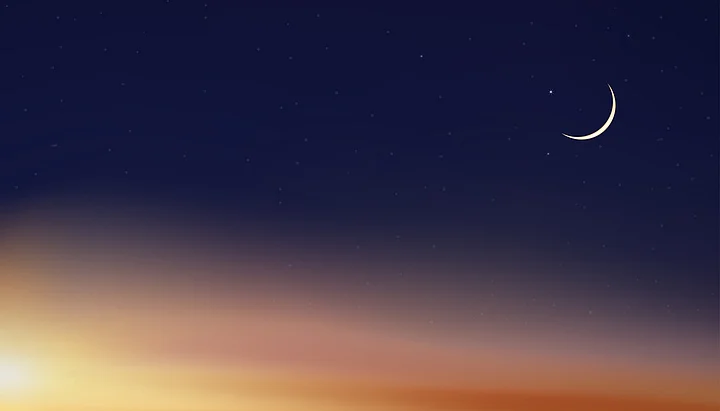Eid-ul-Fitr Moon Sighting Date in India: Eid-ul-Fitr also known as Eid-al-Fitr, Meethi Eid, Id-al-Fitr, and Ramadan Eid marks the end of the holy month of Ramadan. It is an important and auspicious festival observed by all Muslims around the globe. Every year, Eid-al-Fitr immediately follows at the end of Ramadan, but the date varies. All Muslim festivals including Eid is based on the lunar calendar, therefore the date of Eid-al-Fitr is decided after the crescent moon sighting.
The sighting of the crescent moon is extremely important to determine the date of Eid. Different countries may witness Shawwal moon on different dates, therefore the Eid-al-Fitr date varies in many countries. Eid-ul-Fitr is a time of peace and celebration, and it is a time to come together as a community. Let us check out the date of Eid-al-Fitr moon sighting in India and other countries below.
Eid-ul-Fitr Moon Sighting Date in India: When Will be Eid Celebrated in the Country?
This year, the sighting of Shawwal moon for Eid-al-Fitr 2024 in India will take place on the evening of Tuesday, 9 April 2024. If the moon was sighted on 9 April, Eid will be celebrated on 10 April, otherwise, the festival will be observed on 11 April 2024.
The sighting of the crescent moon is a religious rite that is performed to determine the date of Eid-ul-Fitr. According to the Islamic Calendar, Eid-ul-Fitr is based on the sighting of the crescent moon, therefore every year, the festival occurs approximately 10 to 11 days earlier depending on when the Shawwal moon is sighted. The lunar calendar is different from the Gregorian calendar, which is based on the date of the solar moon.
Eid-ul-Fitr Moon Sighting Date in Saudi, UAE, Pakistan and Other Countries
The Supreme Court of Saudi Arabia has called on all Muslims in the country to sight the new crescent moon on the evening of Monday, 8 April which will mark the end of Ramadan and the beginning of the month of Shawwal. The sighting of the crescent moon in Saudi Arabia, UAE, Oman, Qatar, Kuwait, Bahrain, Egypt, Turkey, Iran, United Kingdom, and other countries in the Middle East and West on 8 April evening will confirm that the Eid-ul-Fitr will be celebrated on Tuesday, 9 April 2024. However, if the crescent moon is not sighted on Monday evening, chand raat in these countries will be on Tuesday, 9 April and the Eid-ul-Fitr will be observed on Wednesday, 10 April 2024, indicating that Muslims may observe a 30-day fast this Ramadan instead of 29 days.
According to Pakistan’s Meteorological Department, the Eid-ul-Fitr moon, also known as the Shawwal moon, might be seen in the country on 9 April 2024. The country’s Ruet-e-Hilal Committee chairman has also backed the possibility of a 29-day Ramadan this year based on scientific findings. "The Met Office forecast that in the southern regions of the country the sky will likely be clear, while the sky could be cloudy in the northern regions," stated Media reports.
What is the Significance of Eid Moon Sighting?
Eid al-Fitr is the festival that marks the end of the holy month of Ramadan. It is a time of spiritual reflection and celebration. One of the most important aspects of this festival is the sighting of the Shawwal moon, which marks the start of Eid. The sighting of the crescent moon is not just an astronomical event, instead it has a powerful spiritual and cultural significance. It is a reminder of the unity of people, the importance of tradition, and the beauty and sanctity of Islamic rituals.
The occasion of moon sighting is a time for people to come together and wait for the confirmation of the arrival of new month known as Shawwal. This creates a sense of togetherness and spiritual unity among believers. It also serves as a reminder of the importance of tradition and the preservation of Islamic customs handed down through generations. Ultimately, the sighting of the Eid moon is a time to celebrate the beauty and sanctity of Islamic rituals, strengthen bonds of faith, and enrich the spiritual journey of believers.
(Disclaimer: Parts of this article were generated by AI and published after the content was editorially modified and verified by a human based on their own judgement and expertise. The Quint does not publish AI-generated content without direct human involvement and oversight).
